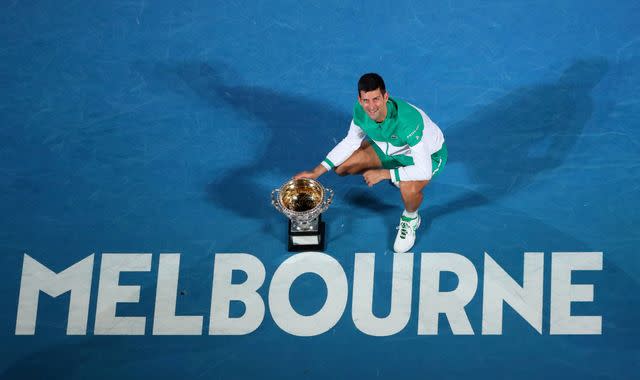
What both sides say in legal battle over tennis star’s expulsion
Both sides in the fight over whether Novak Djokovic should be allowed entry into Australia have now set out the arguments they plan to use in court.
The hearing, which begins at 10:00 a.m. local time in Australia (11:00 p.m. UK) and is expected to end around 5:00 p.m. (6:00 a.m. UK), will be virtual, but will take place in front of the Federal Circuit and Family Court in Australia.
Here are the main arguments that each party will present:
Novak Djokovic
The tennis player said he should have been allowed entry as he had “recently been infected with COVID in December 2021 and on that basis (…) was entitled to a medical exemption in accordance with Australian government rules and guidelines.”
Documents filed with the court say the 34-year-old received a letter from Tennis Australia’s chief medical officer on December 30 “recording that he had been granted a ‘medical exemption from COVID vaccination’ on the grounds that he had recently recovered from COVID “.
Records have shown that Djokovic tested positive for COVID-19 on December 16 and, on the day the letter was sent, she confirmed that the player “had not had a fever or respiratory symptoms in the past 72 hours”.
His lawyers dispute Australian government rules say people can be dispensed from needing a vaccine when a person has had a “PCR-confirmed SARS-CoV-2 infection” in the past six months.
Tennis Australia’s exemption certificate was provided by an independent expert medical review committee commissioned by the body, which was approved by an independent medical exemption review committee of the state government of Victoria , according to the record.
Then, on January 1, Djokovic obtained a document from the Australian Home Office regarding his Australian travel declaration, indicating that his request “‘[had] been evaluated ‘, and'[his] the answers indicate[d] this [he met] the requirements for arrival without quarantine in Australia where the jurisdiction of your arrival permits ”.
His lawyer claims that the jurisdiction he is referring to is the state of Victoria.
Another file indicated that their client was sleep deprived and under pressure from Australian authorities cancel his visa after being detained at Melbourne Airport.
The legal team also appealed on the grounds that the decision had been unfair, had not rationally considered extenuating circumstances, and on various other technical details.
Australian state
Australia’s Home Office relies on its claim that it had not given Djokovic the assurance of a medical exemption he said he had to enter Australia without a COVID-19 vaccination being accepted.
In response to the tennis player‘s claim that his travel declaration form indicated that he qualified for an arrival without quarantine, the government legal team said in a court file: “There is no no guarantee of entry of a non-national into Australia. On the contrary, there are criteria and conditions for entry, as well as grounds for refusal or cancellation of a visa. “
He said the document he received from Home Affairs was no assurance “that his so-called ‘medical exemption’ would be accepted,” and it remained that his answers could be questioned and verified upon his arrival.
The government also took issue with Djokovic’s claim that he was eligible for a medical exemption on the grounds that he had contracted COVID-19.
He stressed that the list of people who could avoid vaccination if it was required only applied if those who requested a temporary exemption had suffered from a “serious and acute medical condition”.
The government’s court record reads: “There is no indication that the claimant suffered from ‘severe and acute illness’ in December 2021. All he said was he tested positive for COVID- 19. It’s not the same. “
There is no indication so far whether the government plans to present any evidence that has appeared in the media that could impact claims he had an acute illness – including a photo of him meeting with children in Serbia apparently the day after his positive test.
But a key part of the government’s case appears to be a section in the immigration law that says an official “may cancel a visa at any time” if he believes that “the presence of its holder … may be, or would be or could be, a risk to … the health, safety or good order of the Australian community. “
Sydney-based immigration law specialist Christopher Levingstone told Sky News: “If you get a visa, it is at best an invitation to show up at the border and then be considered for. entry. A visa is not a guarantee. “
Source link

Comments are closed.